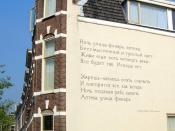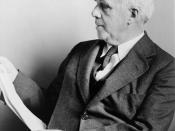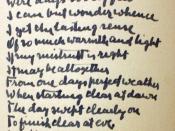Undoubtedly, one of the most recognized and celebrated poets of the twentieth century, Robert Frost wrote a great number of poems dealing with matters of depravity and despair. Frost was able to imbue his poems with a genuine sense of loss, which while profound, can be overlooked if his words are misinterpreted. "Stopping by Woods on a Snowy Evening" and "Acquainted with the Night" are poems that contain many of Frost's characteristic poetic traits. Both poems contain dark symbolism that is not only evident at face value, but appears more pronounced as the reader unravels his sophisticated use of words. "Stopping by Woods on a Snowy Evening" and "Acquainted with the Night" both use natural settings and realistic situations to convey the apparent and obscured symbolism within the text.
"Stopping by Woods on a Snowy Evening" draws on the use of picturesque environments and imaginable experiences to both reveal and conceal the poet's message.
Nature and realism are often used as objects of comparison when relating symbolism in literature since it can be assumed that people have been universally exposed to the two at one point in their lives or another. Frost's poem "Stopping by Woods on a Snowy Evening" states, "My little horse must think it queer To stop without a farmhouse near Between the woods and frozen lake The darkest evening of the year" (II. 5-8). This stanza is particularly rich in somber imagery, pointing out a diminutive horse that the poet rides, the frigid waters, and the blackness of the night that surrounds him. There is no need to make extensive analysis to realize that the poem is of a melancholy nature - it is abundant in its description of a glum setting. The imagery on the surface however...


